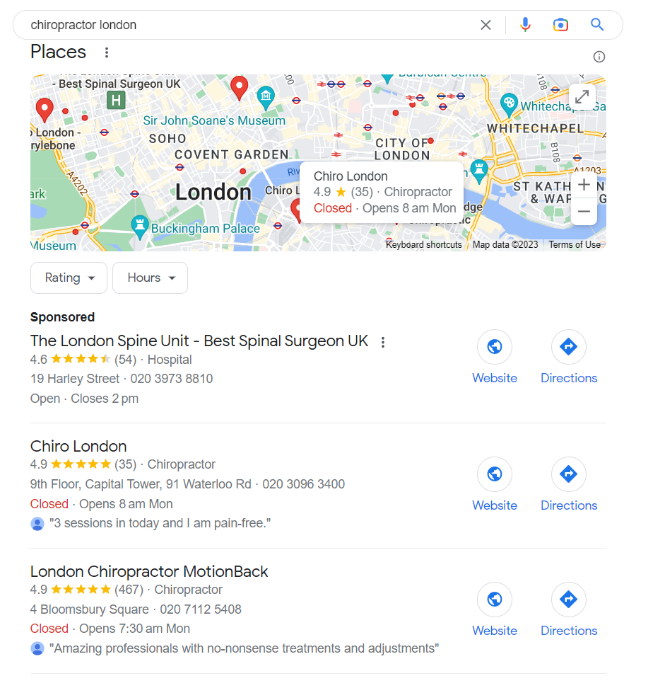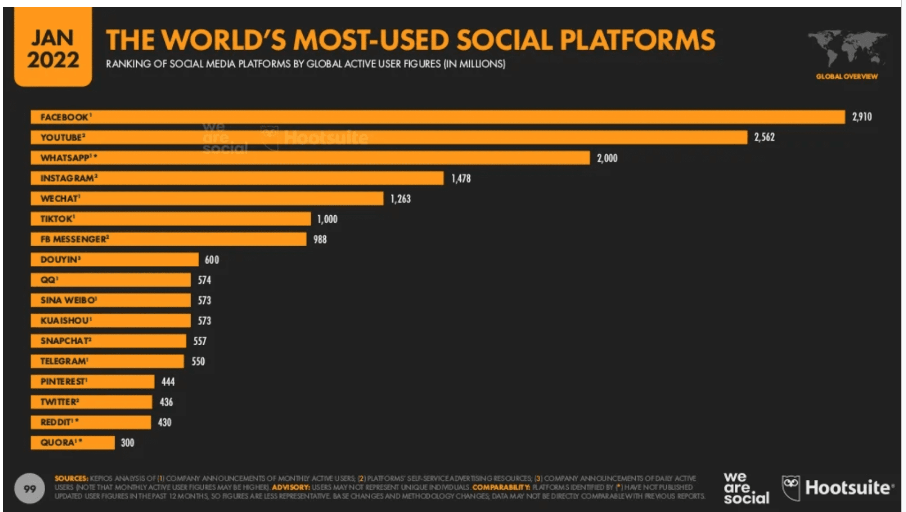How To Do Digital Marketing for A Small Business

If you’ve just launched or are running a small business you’ll no doubt be thinking of ways to get more customers and grow, and digital marketing will likely be your first point of call. And for good reason.
Digital marketing has allowed small businesses to get in front of customers easily and instantly if you have the budget. In this guide, I’ll break down a simple approach to doing digital marketing for a small business, and some key considerations and channels you could use. These channels are all included in our small business marketing packages.
Depending on what type of business you are running some of these channels will be more important than others, which we’ll also highlight.
So first off, you’ll have a few things to think about.
If you haven’t already, create a website
You need a website, it should be one of the first things you do. Get your domain sorted, and then build a website.
That sounds daunting, but in todays world, there are plenty of ways you can quickly make a website with 0 coding knowledge. Or alternatively, you can hire a web design agency or consultant to do this for you.
If you wish to quickly create your own website, Squarespace or Wix would be the easiest way to do this. You can also use WordPress but it will be slightly more complicated. If you’re running a new eCommerce business, Shopify is probably your best option. You can even integrate with an accessibility app to ensure you are compliant with the ADA
Set Up Google Analytics
Add Google Analytics to your website. This is pretty easy using platforms like Squarespace and Shopify, if you’re on WordPress you could look at a plugin such as MonsterInsights.
Alternatively, if a web developer is building, or has built your website you ask them to confirm it’s been added, or they will add it for you.
Set Up Goals
Set up goals or eCommerce tracking within Google Analytics so you can see how many leads or transactions your website is driving each month and from what channel.
Once you are sure you can track traffic on your website, and you have goals or eCommerce tracking set up then you can start to implement digital marketing strategies.
If you start spending money without any tracking in place it’s going to be pretty difficult to say what’s working. With tracking, you can see what channels perform best and where more money could potentially be spent.
Can you do this yourself or do you need help?
How you do marketing will mainly come down to three things, your time, your budget, and your expertise. You may have some budget in mind that you can use, or you may have one person or a small team that can help you with others.
Time
Do you have the time to really do marketing for yourself? If you do, it will only be a limited amount given you have to run a business. This will influence the channels that will work best for you and which ones you can effectively keep an eye on. And, do you also have the time to learn a new skill or platform?
Budget
This will likely be the biggest issue you’ll face. If you have the budget for everything, great. If you don’t you’ll have to pick the channels that can help you achieve your objectives and push growth forward more quickly. Some are better than others for this, which we will highlight below.
First, it will be worth figuring out what your monthly marketing budget can be. From here, you can start to see how much you can afford to do, and how many channels you can potentially use. You may need to test spend on one channel and then another to see which works best for you.
Expertise
The final thing to consider is, do you have the expertise to do it? Are you comfortable figuring it out for yourself? Back to, do you have the time to?
There are plenty of guides and YouTube videos out there that can help you set up the basics, which may be all you need to do for now.
But if you truly want to make these channels work for you, eventually you will need help. That could come in the form of hiring a digital marketing agency or starting with a freelancer. Back to, do you have the budget for this?
The best digital marketing channels for small businesses
1. SEO
Cost: Medium – High
Time: Medium – High
Expertise: High
Results: Long term
Impact: High
If you’re sitting there thinking, what is SEO and how does it work for small businesses? Don’t worry, SEO will become the best channel for your business.
Eventually. But it could take a good amount of time to get it there depending on your industry. Essentially, SEO for small businesses means getting your website to appear higher on search engine result pages for relevant keywords.
At some point, you could even look to hire an SEO agency to completely run things for you. You’ll get way more expertise here, and the impact could be bigger, but you’ll increase your costs if you want to get it done right.
When you’ve either built or are building your website, you need to think about the best way to structure it, what pages you need, and what services or products you want to push.
Take a look at what competitors are doing in terms of content marketing, what pages they have and how their websites look. These will be who you are competing with after all so try to beat them.
Google Business Profile
One of the best things you can do, especially if you are a local business like a plumber or chiropractor (or anything brick and mortar) is to set up your Google Business Profile. It’s completely free, and fairly easy to do.

Once you have this setup, depending on the local competition, you may start appearing in local map packs when people are looking for local suppliers to help them. Add images to your profile, try to get reviews, and make sure you add all the services you can offer to your profile.
2. PPC
Cost: Low – Medium
Time: Short term
Expertise: Medium – High
Results: Short & Long Term
Impact: High
Google Ads still works for small businesses. In fact, it’s probably one of, if not the, best channels you could start with. Unlike SEO you can appear pretty much straight away in search engines for your target keywords. You can even change the settings so ads only appear in certain areas, or even on certain devices to save your budget.
So sign up to Google AdWords, if you’re creating a new account it will likely force you to create an Google Ads express account. You can leave this as a test if you wish to let Google pretty much run things for you, or you can switch to expert mode and manage the campaigns a bit more yourself.
This is where the time and expertise factors will come into play though, there are plenty of resources out there to help you set up campaigns, but you may wish to try and PPC consultant or a PPC agency to help you run things.
If you’ve done your keyword research you’ll have a good list to start campaigns from, make sure these are grouped into relevant clusters and try small campaigns to start off with. Sticking with the chiropractor example above you could also bid on terms like “chiropractor london” so you’re now trying to get traffic using two channels and maximising your exposure on Google Search.
Related Reading: The Benefits Of PPC For Small Businesses
3. Social media marketing
Cost: Low – Medium
Time: Medium – Long Term
Expertise: Low – Medium
Results: Medium
Impact: Low
We’re going to split small business social media strategy into two parts.
- Organic Social (daily posts, responding to customers etc)
- Paid social (running paid ads on social media platforms)
Organic Social is a tricky one, this is an area at the beginning you should try and run yourself. This isn’t a channel where you’re going to get thousands of sales at the beginning, but you need a presence to show your real.
Some customers will check your social profiles before buying from you. Especially if they haven’t before. Organic social is your chance to show your brand personality and interact with potential customers.
With organic social you have a lot of potential profiles to create, Facebook, Instagram, YouTube, TikTok, Linkedin, Snapchat, and the list goes on. But what ones do you actually need to create?
Your time, budget and expertise all come into play here, as well as understanding which social media channels your target audience spends their time on.

- Facebook is the most used social media platform globally, making it a great platform for small businesses to create a Facebook page and interact with their customers. Facebook will be the most likely platform potential customers will look to to confirm you’re real and get some social proof.
- Instagram is ideal for businesses in the fashion, beauty, travel, and food industries, as it’s a visual platform with in-app shopping features.
- Twitter’s conversational and real-time nature makes it ideal for businesses to engage in conversations with customers and create viral content.
- TikTok, with its level playing field, emphasis on creativity, and opportunity for virality, is great for businesses with creative ideas for videos. (and those who can actually create them)
- Pinterest is a positive and highly visual platform where businesses can share beautiful visuals of their products and reach new audiences actively searching for products and services like theirs.
- YouTube is an effective platform for promoting products and services and driving traffic to a business’s website.
So before you go creating endless amounts of social media profiles that are likely to lay dormant and unused analyse where your target audience spends their time and properly commit to the channels with the most potential.
4. Paid Social
Cost: Low – Medium
Time: Short term
Expertise: Low – Medium
Results: Short & Long Term
Impact: Medium
Paid social on the other hand can have an instant impact on your business, in a similar way to Google Ads can. The main difference here is that with paid social your selecting your ideal audience to target.
Again, think about where your target audience is spending the most time, what type of product you’re trying to promote and then what channel allows you to convey the USPs best.
For example, if you’re promoting a small clothing range Facebook, Instagram, TikTok and Pinterest are going to be very good channels to try running ads on as they are more visual and the audience will be more likely to be receptive to seeing relevant ads.
If you’re a chiropractor, Facebook social media ads with local targeting will likely work better than Pinterest ads.
Of course, you can test a small budget across all of these channels and see which ones convert best. (This goes back to making sure you have the right goal set up)
How to do it:
- Pick your social platform to run ads on
- Decide on your budget
- Create your audience
- Decide if you want to run an offer
- Design creative (you can use canva for this, or get someone to help you)
- Launch ads
- Monitor results
Alternative digital marketing channels
Influencers
Influencer marketing is everywhere, and whilst you don’t have to work with Kim Kardashian (never do that) there are smaller influencers who can still help you get infront of a relevant audience.
If you do decide to work with a social media agency they may be able to help you find relevant influencers who can help get your brand out there in different ways.
Email Marketing
You should also aim to build up your email database, this is your 1st party data and a treasure trove for driving repeat purchases and building customer loyalty. If you’re trying to grow an eCommerce business this will be even more important.
There are plenty of tools that can help you build an email list, and send out emails to target customer segments. Platforms such as MailChimp, MailMunch, SendInBlue all offer affordable and easy to use email marketing software.
This is probably a channel you could also manage and do yourself.
Other digital marketing tips to consider
Build Your Brand
In all small business marketing strategies one thing needs to be consistent. Your brand.
In the early days, you’ll need to decide what type of brand image and reputation you want to have. When you initially came up with your idea, it may have been to solve a problem, or to do something better, always keep that in mind and reflect that in your branding and marketing.
Your core brand values need to be in everything you do. For example, if you do choose to use an influencer you need to make sure they truly represent your brand in a positive way and reinforce your brand values.
Social Proof
This should be something you keep top of mind from day one. You need to build trust in your business. With the digital marketing activities above chances are you’ll be getting in front of people who have never seen or heard of you before. Why would they buy from you?
This is where social proof comes in. Social proof can be anything from reviews, a Trustpilot page, testimonials, video testimonials, Google Business Profile reviews, UGC content, or star ratings on your product pages.
Basically, anything that asks as proof someone has bought your product or service before and it’s been a good experience.
You want to be building as much of this as you can over time, and doing it consistently.
Marketing Tools
You’ll also need to think about any tools that can potentially help you manage some of these digital marketing channels. Luckily there are plenty of these to choose from, some even have free versions.
For example, the below tools could help save you time and money, and just make things a bit easier to manage.
- Canva: A graphic design tool that allows users to create a variety of visual content, including social media posts, infographics, and presentations.
- Google Analytics: A web analytics service that provides insights into website traffic and user behavior.
- Hootsuite: A social media management tool that allows users to schedule posts and manage multiple social media accounts from one dashboard.
- Buffer: A social media management tool that allows users to schedule and publish posts to multiple social media accounts.
- SEMrush: A tool for competitive analysis and keyword research.
- HubSpot CRM: A free customer relationship management tool that allows users to organize and manage customer information.
- Mailchimp: A tool for email marketing that allows users to create and send email campaigns.
- Trello: A project management tool that allows users to organize and collaborate on projects using boards and cards.
These tools can be helpful for businesses and individuals looking to improve their marketing efforts without breaking the bank.
Looking for expert support with your digital marketing strategies?
Introducing Dandy: your dedicated, to-the-point marketing specialists.
Our affordable SEO packages and PPC management packages offer flexible, rolling monthly contracts, meaning you’re never tied into any service you don’t need.
We understand not only how important digital marketing is for small or medium-sized businesses, but also how hard it can be to manage the monthly demands of running said businesses, which is why our services are designed to take the hassle out of digital marketing for you.
Get in touch today to find out more about how Dandy can help your business shine online.We look forward to hearing from you!
Grab a free, no-obligation SEO audit today to get started!
Digital marketing strategy for small business FAQs
Does digital marketing work for a small business?
Yes! Digital marketing is an incredibly effective way for small businesses to reach their target audience and grow their customer base. It’s cost-effective, can be tailored to suit any budget, and offers a great return on investment if done correctly.
How much does digital marketing cost for a small business?
The cost of digital marketing for any business will largely depend on the channels you choose to use, the level of expertise you need and how much time is required. Some channels may be free or require minimal investment, such as organic social media management. Others can be more expensive, such as pay-per-click (PPC) advertising campaigns.
How do I start digital marketing step-by-step?
The first step in starting a digital marketing campaign is to identify your target audience.
Once you know who you’re targeting, the next steps involve planning out what channels will be most effective for reaching them, creating a content marketing strategy that resonates with them and setting up tracking and analytics systems so that you can monitor the success of your campaigns.
Finally, consider enlisting the support of SEO experts or a digital marketing agency to help you achieve your goals.

